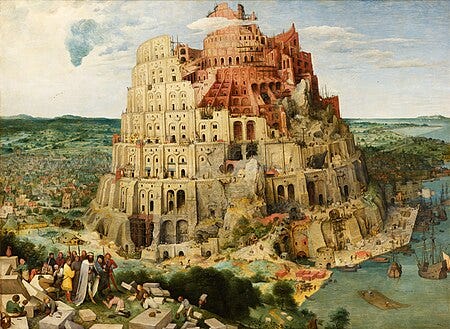Harmony Redeemed: From Babel's Dissonance to Pentecost's Divine Unity
Exploring the Prophetic Connection Between the Tower of Babel and Acts 2

The Tower of Babel and Pentecost: Divine Unity Amidst Linguistic Diversity
Introduction:
Within the earliest account of biblical history, a narrative unfolds, spanning from the Tower of Babel to the transformative event of Pentecost. This remarkable journey through Genesis to Acts invites us to explore the intricate tapestry woven by divine hands, revealing profound connections between human endeavors and the redemptive work of the Spirit. In this exploration, we delve into the Tower of Babel and its profound link to the outpouring of the Holy Spirit in Acts 2—a connection that brings unity amidst linguistic diversity.
The Tower of Babel: An Ascent of Human Pride:
Genesis introduces us to a moment in humanity's early journey, a moment marked by the audacious construction of the Tower of Babel. The people, unified in language and purpose, sought to ascend to the heavens, erecting a structure that would symbolize their collective prowess and autonomy. However, divine intervention shattered their linguistic unity, scattering them across the earth. This narrative, pregnant with theological nuances, lays bare the consequences of human pride and autonomy apart from God.
Scattered Languages, Fragmented Unity:
The linguistic dispersion at Babel was not merely a punitive measure; it underscored the fractured nature of human unity when severed from divine alignment. The diversity of languages became a symbol of disunity and an enduring reminder of humanity's proclivity towards autonomy. As we gaze upon the remnants of the tower, we discern the echoes of a broken unity—a consequence of the pursuit of self-exaltation.
Pentecost: A Divine Reversal:
Fast forward to the early Christian community gathered in Jerusalem during Pentecost. The echoes of Babel resound as the disciples, empowered by the Holy Spirit, speak in diverse languages. Yet, instead of linguistic confusion and dispersion, Pentecost heralds a divine reversal. The multitude hears the apostles proclaiming the mighty works of God in their native tongues—an awe-inspiring spectacle of divine unity amidst linguistic diversity.
Redemption in the Spirit's Unveiling:
The outpouring of the Holy Spirit at Pentecost becomes a powerful redemptive act, reconciling the fractured unity initiated at Babel. The Spirit, like a unifying thread, joins peoples from every nation, tongue, and tribe in a common understanding. The diversity of languages, once a symbol of division, transforms into a manifestation of God's inclusive love—a foreshadowing of the ultimate unity in Christ.
Conclusion:
The Tower of Babel and Pentecost stand as contrasting chapters in the story of human endeavor and divine intervention. The broken unity of Babel finds redemption in the Spirit's outpouring, uniting diverse languages in a harmonious proclamation of God's works. As we reflect on this divine symphony, we glimpse the beauty of unity amidst diversity—a foretaste of the ultimate reconciliation that awaits us in the consummation of God's redemptive plan. The Tower's echoes, once haunting, now harmonize with the Spirit's revelation, inviting us to participate in the grand narrative of divine unity and restoration.


